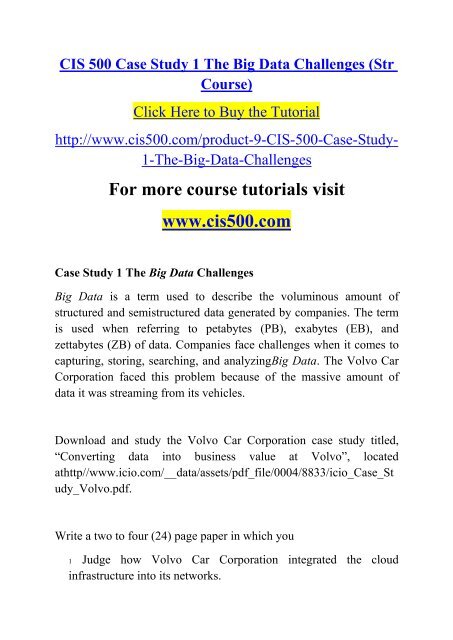CIS 500 Case Study 1 The Big Data Challenges (Str Course)
For more course tutorials visit www.cis500.com Case Study 1 The Big Data Challenges Big Data is a term used to describe the voluminous amount of structured and semistructured data generated by companies. The term is used when referring to petabytes (PB), exabytes (EB), and zettabytes (ZB) of data. Companies face challenges when it comes to capturing, storing, searching, and analyzingBig Data. The Volvo Car Corporation faced this problem because of the massive amount of data it was streaming from its vehicles.
For more course tutorials visit
www.cis500.com
Case Study 1 The Big Data Challenges
Big Data is a term used to describe the voluminous amount of structured and semistructured data generated by companies. The term is used when referring to petabytes (PB), exabytes (EB), and zettabytes (ZB) of data. Companies face challenges when it comes to capturing, storing, searching, and analyzingBig Data. The Volvo Car Corporation faced this problem because of the massive amount of data it was streaming from its vehicles.
- No tags were found...
Create successful ePaper yourself
Turn your PDF publications into a flip-book with our unique Google optimized e-Paper software.
<strong>CIS</strong> <strong>500</strong> <strong>Case</strong> <strong>Study</strong> 1 <strong>The</strong> <strong>Big</strong> <strong>Data</strong> <strong>Challenges</strong> (<strong>Str</strong><br />
<strong>Course</strong>)<br />
Click Here to Buy the Tutorial<br />
http://www.cis<strong>500</strong>.com/product-9-<strong>CIS</strong>-<strong>500</strong>-<strong>Case</strong>-<strong>Study</strong>-<br />
1-<strong>The</strong>-<strong>Big</strong>-<strong>Data</strong>-<strong>Challenges</strong><br />
For more course tutorials visit<br />
www.cis<strong>500</strong>.com<br />
<strong>Case</strong> <strong>Study</strong> 1 <strong>The</strong> <strong>Big</strong> <strong>Data</strong> <strong>Challenges</strong><br />
<strong>Big</strong> <strong>Data</strong> is a term used to describe the voluminous amount of<br />
structured and semistructured data generated by companies. <strong>The</strong> term<br />
is used when referring to petabytes (PB), exabytes (EB), and<br />
zettabytes (ZB) of data. Companies face challenges when it comes to<br />
capturing, storing, searching, and analyzing<strong>Big</strong> <strong>Data</strong>. <strong>The</strong> Volvo Car<br />
Corporation faced this problem because of the massive amount of<br />
data it was streaming from its vehicles.<br />
Download and study the Volvo Car Corporation case study titled,<br />
“Converting data into business value at Volvo”, located<br />
athttp//www.icio.com/__data/assets/pdf_file/0004/8833/icio_<strong>Case</strong>_St<br />
udy_Volvo.pdf.<br />
Write a two to four (24) page paper in which you<br />
Judge how Volvo Car Corporation integrated the cloud<br />
infrastructure into its networks.
Explain how Volvo Car Corporation transforms data into<br />
knowledge.<br />
Identify the realtime information systems implemented and<br />
evaluate the impact of these implementations.<br />
Argue how the <strong>Big</strong> <strong>Data</strong> strategy gives Volvo Car Corporation a<br />
competitive advantage.<br />
Use at least three (3) quality resources in this assignment. Note<br />
Wikipedia and similar Websites do not qualify as quality resources.<br />
Your assignment must follow these formatting requirements<br />
Be typed, double spaced, using Times New Roman font (size<br />
12), with one inch margins on all sides; citations and references<br />
must follow APA or school specific format. Check with your<br />
professor for any additional instructions.<br />
Include a cover page containing the title of the assignment, the<br />
student’s name, the professor’s name, the course title, and the date.<br />
<strong>The</strong> cover page and the reference page are not included in the<br />
required assignment page length.<br />
<strong>The</strong> specific course learning outcomes associated with this<br />
assignment are<br />
Explain how the components of an information technology<br />
system interrelate in an organizational context.<br />
Use technology and information resources to research issues in<br />
information systems and technology.
o Write clearly and concisely about topics related to<br />
information systems for decision making using proper writing<br />
mechanics and technical style conventions.<br />
Compare and contrast the strategic and operational use of data<br />
management systems.

















